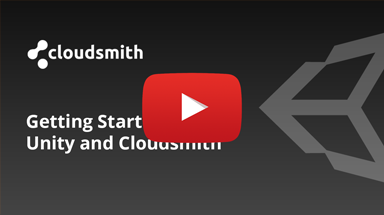Unity Registry
Cloudsmith provides public & private repositories for the Unity Development Platform

For more information on Unity, please see:
- Unity: The official website for Unity
- Unity Docs: The official documentation for Unity
- Unity UPM: Documentation for Unity's Package Manager
- Unity UPM Scoped Registry: Documentation to setup a Scoped Package Registry
In the following examples:
| Identifier | Description |
|---|---|
| OWNER | Your Cloudsmith account name or organisation name (namespace) |
| REPOSITORY | Your Cloudsmith Repository name (also called "slug") |
| TOKEN | Your Cloudsmith Entitlement Token (see Entitlements for more details) |
| API-KEY | Your Cloudsmith API Key |
| PACKAGE_NAME | The name of your Unity package |
| PACKAGE_VERSION | The version number of your package |
Upload a Package
Publish via npm
As Unity packages are compatible with npm registries, you can publish your Unity packages to a Cloudsmith npm registry via the native npm tooling.
Setup
The endpoint for the native npm API is:
https://npm.cloudsmith.io/OWNER/REPOSITORY/
In order to authenticate for native publishing, you can either use npm login or create an npmrc file (in your $HOME or in the project directory)
Use npm login:
npm login --registry=https://npm.cloudsmith.io/OWNER/REPOSITORY/
Username: USERNAME
Password: API-KEY
Email: YOUR-EMAIL-ADDRESS
Or create an .npmrc file with the following:
registry=https://npm.cloudsmith.io/OWNER/REPOSITORY/
//npm.cloudsmith.io/OWNER/REPOSITORY/:_authToken=API-KEY
Publish
Once you have set up the registry, you can then publish from your project directory using npm publish:
npm publish --registry=https://npm.cloudsmith.io/OWNER/REPOSITORY/
For more details on npm publish see the official npm documentation. (external link)
Upload via the Cloudsmith CLI
For full details of how to install and setup the Cloudsmith CLI, see Command Line Interface.
To upload via the Cloudsmith CLI / API, you'll need to generate your package first. You can do this with:
npm pack
This will generate a tarball file (.tgz) like your-package-1.2.3.tgz that you can upload.
This assumes that you've created a
project.jsonfile for your project. Please see the official npmjs [package.json reference] (https://docs.npmjs.com/files/package.json) (external link) for more information.
The command to upload a Unity package via the Cloudsmith CLI is:
cloudsmith push npm OWNER/REPOSITORY PACKAGE_NAME-PACKAGE_VERSION.tgz
Example:
cloudsmith push npm your-account/your-repo com.cloudsmith.assets--1.0.0.tgz
Upload via Cloudsmith Website
Please see Upload a Package for details of how to upload via the Website UI.
Download / Install a Package
Public Registries
To download/install a Unity package, you need to add your Cloudsmith registry to your Unity project's manifest.json file as a scoped registry:
"scopedRegistries": [
{
"name": "NAME",
"url": "https://npm.cloudsmith.io/OWNER/REPOSITORY/",
"scopes": [
"SCOPE"
]
}
],
You then add the packages that you wish to download and install to the dependencies section of the project manifest.json file:
"dependencies": {
"PACKAGE_NAME": "PACKAGE_VERSION"
}
}
For example:
{
"scopedRegistries": [
{
"name": "MyRegistry",
"url": "https://npm.cloudsmith.io/demo/examples-repo/",
"scopes": [
"com.cloudsmith",
]
}
],
"dependencies": {
"com.cloudsmith.assets": 1.1.2"
}
}
For further information, please see the Unity documentation on Scoped Registries.
Private Registries
To download/install a Unity package from a private Cloudsmith registry:
- Add the registry and dependencies to your project's
manifest.jsonas per the instructions for public registries - Locate the
upmconfig.tomlfile and add the one of the following, depending on which authentication method you wish to use:
[npmAuth."https://npm.cloudsmith.io/OWNER/REPOSITORY/"]
token = "TOKEN"
email = "EMAIL" OPTIONAL
alwaysAuth = true OPTIONAL
[npmAuth."https://npm.cloudsmith.io/OWNER/REPOSITORY/"]
token = "API-KEY"
email = "EMAIL" OPTIONAL
alwaysAuth = true OPTIONAL
If the file does not already exist, create an empty text file.
Entitlement Tokens, User Credentials and API-Keys should be treated as secrets, and you should ensure that you do not commit them in configurations files along with source code or expose them in any logs.
Unity Package Manager Global configuration file location:
| Environment | Location |
|---|---|
| Windows | %ALLUSERSPROFILE%\Unity\config\upmconfig.toml |
| macOS and Linux | /etc/upmconfig.toml |
Unity Package Manager User configuration file location:
| Environment | Location |
|---|---|
| Windows | %USERPROFILE%.upmconfig.toml |
| macOS and Linux | ~/.upmconfig.toml |
For further information, please see the Unity documentation on scoped registry authentication
Key Signing Support
GPG
Troubleshooting
Please see the Troubleshooting page for further help and information.
Updated about 2 years ago

